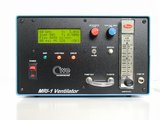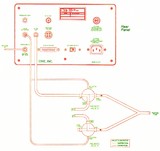Beatmungsgerät MRI-1-Ventilator [MRI-1]
MRI / NMR kompatibles, mit pneumatischen Ventilen betriebenes Beatmungsgerät.

|
MRI-1 Ventilator
The MRI-1 Ventilator is a small animal ventilator designed
for use in MRI and other high magnetic field environments.
The system comprises a microprocessor-based control
unit and a set of remote, pneumatically operated, non-metallic
valves. The MRI-1 can operate by itself or can be controlled
and/or monitored by a computer.
The MRI-1 operates on the flow-time principle: an inspiratory
airflow is established and gated into the animal for a
known time, thus producing a known volume. This approach
provides extraordinary flexibility a wide range of volumes,
breaths-per-minute, and I/E ratios are possible with no hardware
changes, and using just three front-panel controls.
Respiratory airflow is provided by an internal airpump.
Alternatively, an external pressurized gas source can be
attached (oxygen or anesthetic gasses).
The remote high-speed, miniature pneumatic valves do
the actual airflow switching. By locating these valves close to
the animal (including inside the magnet bore if necessary),
dead-space and tubing compliance are minimized.
|
|

|
Operation
Setting up and operating the MRI-1 is easy. Two lengths
of flexible tubing connect the control unit and the valves; one
supplies the inspiratory airflow and the other is the pressure
source for operating the valves. Only three controls are
required: RESPIRATORY RATE is set in breaths/minute; the FLOW
RATE is set using the front-panel flowmeter (and measured
internally by a mass flowmeter); and the PERCENTINSPIRATION
is set to establish the ratio of inspiration to expiration time
(I/E ratio). All respiratory parameters are shown on the frontpanel
LCD display. The tidal volume and minute ventilation
reflecting the current settings is also continuously displayed,
and can easily be changed by adjusting the FLOW RATE.
|
|
|
Expandable
Of course, the MRI-1 can also be used in other than magnetic
environments. Because of the non-electrical nature of
the ventilation valves, this unit is particularly well suited to
sensitive electrophysiology recording situations. Besides the
standard miniature pneumatic valves, the MRI-1 accepts any
of the valve assemblies available for the popular SAR-830
series ventilators. Using the MVA-4 multi-valve expander, it
is also possible to ventilate several rodent-sized animals
simultaneously using just one MRI-1 as the control unit. The
external valves operate synchronously, but tidal volumes are
independently set by varying the flow rate to each valve
assembly.
A source of compressed air or helium is required for operating
the pneumatic valves. This is attached to the rear panel
of the unit, and the pressure is internally switched on or off as
required for remote valve operation. Helium is often used as
the actuating gas because its lower density and viscosity permits
somewhat faster valve switching. All models feature
switchable 120/240VAC operation.
|
|

|
MRI-1 Volume-cycled Ventilator Standard Features
- Non-magnetic pneumatic valves
- Dependable all-electronic ventilator
- Wide tidal volume and rate range
- Mice to Guinea pig size
- Safe with oxygen and anesthesia
- Direct readout of volume and rate
|
Weiterführende Seiten zum Thema

